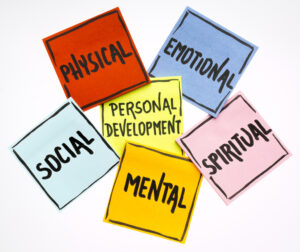Do you struggle with depression? Are you worried that you won’t be able to make any meaningful changes in your life? If so, you’re not alone. Struggling with depression makes setting (and following through with) New Year’s resolutions even more of a challenge. Figuring out meaningful, realistic goals this time of year, may seem overwhelming. When you lack motivation to even get out of bed, going to the gym may be impossible. However, there are some less-overwhelming resolutions out there that you may not have considered.
Feeling pressured to set New Year’s resolutions?

While not everyone struggles with depression, more than half of all new year’s resolutions fail (1). In fact, only about 20% of folks stick to their goals, with most people give up by mid-January (2). Why do people fail, though? Research has shown that most resolutions are unsuccessful because they (2):
- Are too vague
- Are not realistic or achievable
- Don’t have a plan to be successful
- Are not meaningful to the individual
- Are based on societal expectations
In other words, everyone struggles with follow through on resolutions. Just because you have depression, doesn’t mean you are destined to fail. You may just need to find the right goal for you. But, how do you go about making an achievable New Year’s resolution?
SMART Goals
Use the SMART approach to narrow the focus of the goal or resolution. SMART, is an acronym created in the early 1980s by a management journal (2). It describes goals that are “specific, measurable, achievable, relevant and time-bound”. This model helps to focus a goal and provides a more concrete direction. For example, suppose you want to lose weight to start the new year. Where do you start? How much weight do you want to lose? How do you want to go about doing it? Is there a deadline? Let’s take a look at how you could set a SMART resolution.
- Specific: Saying you want to ‘lose weight’ is a very general statement. Although improving your health is always a good idea, make your goal more specific. Maybe you want to lose ten or fifteen pounds. Or maybe you’d prefer to tone your body, build muscle or reach a certain body fat percentage. Decide what the ideal goal is and draw a line in the sand.
- Measurable: Making a goal measurable is also helpful. If you can’t measure your progress, how will you know if or when you achieve your goal? Find a way to track your progress. Celebrate small successes along the way. If you are losing weight, seeing the number on the scale drop is an obvious measurable outcome. Another could be losing inches around your waist or fitting into a piece of clothing you like.
- Achievable: Whatever you decide your resolution should be, make it achievable. Losing 20 pounds might be goal. However, it may not be possible (or healthy) if you are a 30-year-old female who weighs 120 pounds already. Make sure your resolution is attainable and healthy. It’s often preferable to take small steps.
- Relevant: Have you ever been asked to do something that you didn’t want to do? Were you motivated to do it? Probably not. The same goes for setting goals. If your resolution isn’t relevant or meaningful to you, chances are you won’t work towards it very long. Continuing with our example, if you aren’t motivated to lose weight, you probably won’t try very hard. On the other hand, if you want to lose weight, you’ll be much more motivated to work out and change your diet.
- Time-sensitive: If you set a goal, but don’t have a “complete it by” date, how motivated will you be to work towards it? Again, probably not very. However, your timeline also needs to be realistic. If you want to lose 20 pounds by the end of January, you likely won’t be successful. Losing 20 pounds in ten years is also a very long timeline and things may upset your progress. Chose a time limit that is realistic and allows you the best opportunity to be successful. This will also help increase motivation, as you will want to meet your goal by a certain date.
If you are able to create a SMART goal or resolution, you will have a better chance at being successful. Setting a specific goal that is achievable and meaningful, may be half the battle. But what happens if you are also struggling with depression?
If you find that your not making progress with your goals, shrink them! And then shrink them again! Break them down into small chunks. If “walking for 30 minutes, 5 days per week” isn’t happening – try shrinking it to 20 minutes, 5 days per week; then ratchet it down to 10 minutes, 5 days per week; and so on. When reducing your goal, reducing “duration” is a better approach than reducing “frequency”. It is in the repeat, repeat, repeat-mode that we begin to build the new brain pathways that are the neural groundwork for habits. Making the goals super small makes them super achievable.
New Year’s Resolutions with Depression
Depression can make it very difficult to accomplish daily tasks, let alone a New Year’s resolution. When you struggle to get out of bed in the morning, how could you do anything else? Here are some ideas that may help you seem less overwhelmed by the new year (3, 4, 5):
- Focus on positive affirmations: It’s easy to get sucked into negativity. Try identifying one positive thing about yourself per day. Maybe keep a list in a journal or on your phone. State your strengths, talents, and qualities that are positive and work on building yourself esteem.
- Find joy: Try doing one thing per day that you enjoy. Even if it’s as simple as watching a movie, going for a walk, or eating something you like. Again, you can keep track of this goal in a journal, on your phone, or by making a checklist.

Choose one area to focus on. And, choose the easist one to improve your chances of success! - Work on gratitude: It’s easy to focus on what we ‘aren’t’ or what we don’t have. Instead, try to focus on what you do have and what you’re thankful for. This could be as basic, as “I’m grateful that I have a place to live” or “I’m grateful that I have air in my lungs”. Try thinking about or writing down 1-3 things you’re grateful for per day. Remembering what you have. Practicing gratitude helps improve mood.
- Complete one productive task per day: Sometimes, depression can make it very difficult to find motivation. However, try making a to-do list. Attempt to do one thing per day. This might make your list seem less overwhelming and take pressure off you to get ‘everything’ done right away. Prioritize your list. Do the most time-sensitive things first.
- Practice healthy habits: Sometimes, the best thing you can do is focus on yourself. Things like going to bed and getting up at the same time and drinking water, naturally help our bodies to feel better. Try making a diet and exercise plan for yourself. This doesn’t have to be time consuming. Maybe eat one healthy meal per day or go for a walk twice a week. Whatever this looks like for you, practice a healthy habit regularly.
- Do some self-care: If you are struggling to take care of yourself, try practicing some basic self-care techniques. Journal, listen to music or do some stretching. See a friend or family member, watch a movie, or say ‘no’ to something that is too much. Focusing on your mental health is just as important as focusing on your physical health. Practice these coping-skills a couple of times per week.
- Get help if you need it: It is ok to ask for help if you need it. It doesn’t matter if you seek professional help or assistance from a friend or loved one. Maybe your goal is starting and attending therapy sessions once per week. Therapists and counselors are trained in help strengthen motivation, build a foundation of healthy self-care, and ease depression symptoms. Therapy has been found to be very beneficial in treating depression and may be a great place to start.
A new year’s resolution does not need to be a huge goal. Big changes start with small steps. Set a goal that is healthy, appropriate, realistic, and doable for you. Remember to set SMART goals and make them applicable to you. Try not to compare your resolutions to that of your friends. Depression can make setting a resolution overwhelming. It’s ok to start small and work your way up. Setting a New Year’s resolution should be something that excites you and be something that you enjoy. Have fun with it!

If you are tinkering with the idea of “dealing with” long-standing or emergent mental, emotional, or behavioral struggles, please consider accessing mental health services at Wellness Matters or elsewhere. Nowadays, getting mental health support and therapy is easier than ever before. The Wellness Matters intake process is all on-line, lessening the time and effort for getting started. On-line services make it possible to attend from the comfort from your home or office. In-person services may also be available.
Read about the therapists at Wellness Matters who provide private services in the “About Us” tab. You can connect with the Wellness Matters Intake Coordinator by texting or calling 218-616-1276.
————————————————————————————————————————
Article written by Emily Pierson, Contract Mental Health Therapist at Wellness Matters LLC.
References/Resources
1. How to Make (and keep) a New Year’s Resolution. The New York Times. Retrieved from: https://www.nytimes.com/guides/smarterliving/resolution-ideas. Accessed December 29, 2021.
2. This is Why Most New Year’s Resolutions Fail: Most people make the same mistake every year. Psychology Today. Retrieved from: https://www.psychologytoday.com/us/blog/what-mentally-strong-people-dont-do/201912/is-why-most-new-years-resolutions-fail. Accessed December 29, 2021.
3. 5 New Year’s Resolutions for Depression. Retrieved from: https://www.nami.org/Blogs/NAMI-Blog/January-2019/5-New-Year-s-Resolutions-for-Depression/ Accessed December 29, 2021.
4. The 5 Best New Year’s Resolutions for your Mental Health. Retrieved from: https://www.talkspace.com/blog/mental-health-new-years-resolution-ideas/. Accessed December 29, 2021.
5. 5 New Year’s Resolutions for Managing Depression. Modern Therapy. Retrieved from: https://moderntherapy.online/blog-2/2021/1/3/5-new-years-resolutions-for-managing-depression. Accessed December 31, 2021.




